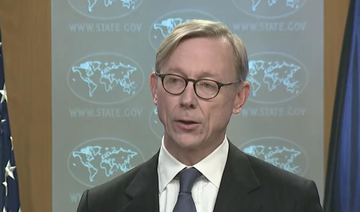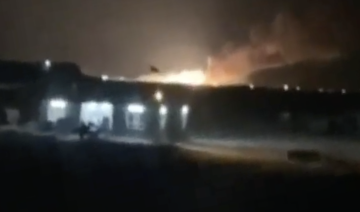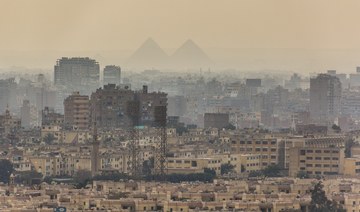LONDON: Western governments and international bodies, including the EU, should designate Iran’s Islamic Revolutionary Guard Corps (IRGC) as a foreign terrorist organization, the London-based Tony Blair Institute for Global Change said in a report published on Tuesday.
The IRGC acts as an “institutionalized militia,” and uses its vast resources to spread a “mission of jihad” through an “ideological army” of recruits and proxies, said the report, titled “Beyond Borders: The Expansionist Ideology of Iran’s Islamic Revolutionary Guard Corps.”
The IRGC’s interpretation of Islam bears a “striking” resemblance to the extremist teachings of Sunni groups such as Al-Qaeda and Daesh, the report added.
The institute published its findings on the back of work to translate training manuals, used and freely distributed by the IRGC online, into English from Farsi for the first time.
Its analysis of the material uncovered what it called a “formalized system of indoctrination that seeks to radicalize its recruits with an extremist Islamist ideology.”
Tony Blair, former UK prime minister and executive chairman of the institute, said the international community needs to recognize the role that the IRGC plays in spreading terrorism and extremism.
“The IRGC is not simply an arm of the state, it is a body dedicated to advancing an ideology based on an extreme and intolerant distortion of Islam. It is time we recognized this formally,” he said.
“Extremist ideology gives rise to violent extremism. Defeating it, and calling out those groups and organizations which promote it, is a vital part of a peaceful and prosperous future for the region.”
The report found that the IRGC’s indoctrination process includes promoting a universal Shiite Islamist worldview that it said is “violent and absolutist,” and that “casts both non-Muslims and regime opponents (including Muslims) as enemies of Islam and calls for armed jihad against them.”
The report said the IRGC exists as a way of life in the way it spreads edicts on the ideal structure of society, including promoting the subjugation of women.
The report’s author, Kasra Aarabi, said the IRCG’s use of the internet to radicalize people is something that tech companies in the West have yet to come to terms with.
The IRGC is able to operate “unhindered” by safeguards normally employed to monitor and restrict propaganda by Salafist-jihadist groups, he added.
Recognizing this, and moving to prevent the IRGC’s dissemination of material, would be a key component of any strategy by the international community to combat its extremism, he said.
“These internal manuals reveal how the IRGC operates as an institutionalized militia, with a formal program of indoctrination that seeks to radicalize its members and proxies in the region with a violent distortion of Islam,” Aarabi added in the report.
“As the new evidence in our report shows, the IRGC’s Shia extremist ideology has much in common with Salafi-jihadism and policymakers should therefore treat it with the same seriousness as Daesh (Daesh) and Al-Qaeda.”
Prof. Saeid Golkar, an expert on the IRGC at the University of Tennessee in the US, said: “Until now, there has been a void in any tangible evidence put to policymakers about the material and content distributed by the IRGC to its growing number of recruits.”
He added: “It is clear from the documents analyzed in this report that the IRGC has a comprehensive and harmful indoctrination system that seeks to radicalize its members with a violent Islamist ideology that will be hard to reverse without a concerted effort.”
The IRGC was formed in 1979 in the aftermath of the Iranian revolution, and has around 125,000 personnel, encompassing all areas of conventional military strength.
Its proxies are known to be militarily engaged in a number of conflicts across the Middle East and further afield.
The IRGC is known to be providing assistance to groups in Yemen, Iraq, Syria, Lebanon and elsewhere.
It is thought to have been behind attacks on oil tankers in the Strait of Hormuz, and missiles launched against Saudi Aramco processing facilities at Abqaiq and Khurais in 2019.
The IRGC was catapulted into global news cycles at the start of 2020 when Gen. Qassem Suleimani, a senior figure and the commander of its elite Quds Force, was assassinated in a US drone strike in Baghdad.
The IRGC has since admitted responsibility for the downing of a Ukrainian passenger jet above Tehran in the immediate aftermath of the drone strike.




























